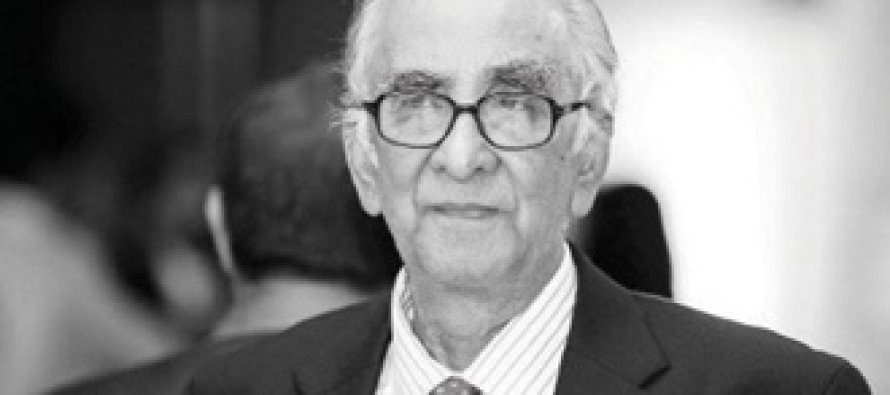Chief Justice Muhammad Habibur Rahman: First Death Anniversary

If Justice Muhammad Habibur Rahman Rahman were alive to day, he would have never approved the title “Chief Justice” before his name of the heading of this article because he was a modest person and always shunned titles and accolades. He just wanted to be known as Muhammad Habibur Rahman without any titles.
I recall with great sadness that last year on 11th January, chief Justice and chief adviser of the caretaker government passed away. I did not expect his untimely death because I used to contact him quite often to discuss various things of life. Even two days before his death, I spoke to him.
He was a Professor, a Barrister, a Judge, a philosopher-thinker, poet, prolific writer of about 90 books on law, language, literature, Rabindranath Tagore, anthropology including the translation of the holy Q’uran–all rolled into one..
Justice Rahman’s threefold goals have been to serve his country, to serve his people by uncovering the truth and to send message among the people the importance of values of equality, liberty, participatory democracy and social inclusion.
When he passed away, messages of condolences and tributes poured in as you would expect, from legions of people, and politicians irrespective of parties and the messages illustrated that he was a real inspiration through the force of his convictions and his ideals.
After completing BA honours from Rajshahi College, he took admission in Dhaka University and completed his masters (1951) in history and secured first class. He also obtained LLB from the Dhaka University.
He was elected as a Vice President of the Salimullah Muslim Hall in 1951 and was frank about that he could not pass the budget of the Hall Union. He played a key role in the 1952 Language Movement and it was he together with another student who first came out openly on the street and defied the Section 144 imposed on 21st February 1952 by the Pakistani ruler. He was also arrested on February 21, 1952 along with many others from a procession.
Much later since Justice Rahman had the first-hand knowledge about what happened on 21st February in 1952, he felt very strongly about the importance of mother tongue in life of every one and wrote a book titled “Speaks for All Languages” which has been a ground-breaking and seminal work which has contributed to the understanding of importance of all mother languages
He appeared at the Central Superior Service examination and was successful but because of the adverse police report, he could not join either into civil service (CSP) or foreign service (PFS). To embarrass the government he thought of an innovative protest by selling cigarettes at the gate of the Dhaka University. Since he was a tall person, no one could miss him.
Soon to avoid such protest by a brilliant student, the government offered him a scholarship to Oxford University which he completed in modern history in 1958 and masters in 1962 at Oxford University. Since he had given a bond to Rajshahi University, he had to teach history at the Rajshahi University for five years after his return from England.
We knew him as a “Shelley” Bhai. As a student junior to him, we tended to gravitate towards him because of his brilliance in his studies. He used to inspire us and encourage us to do right things. We admired him, respected him and loved him.
I have known him in different context and in different times. After Dhaka, in London, I suddenly met him at the Lincoln’s Inn where he and I were enrolled to become a Barrister. He earned the professional degree of Barrister-at-Law in 1959.
Justice Habibur Rahman left Rajshahi and joined the Dhaka High Court Bar in 1964. Again I met him at the High Court Bar. We used to sit on a long table side by side until I left the Bar and discussed many political and social issues. I could easily ascertain his thought-provoking ideas and thinking about the issues which deeply impressed me. During that time he wrote a very useful booklet on compulsory requisition of lands by the government which became a hot topic in litigations at the High Court.
He served as a judge of the High Court Division from 1976 to 1985, Appellate Division of the Supreme Court during 1985-1995 and, and as chief justice of Bangladesh in 1995. He served as the Chief Adviser of the care-taker government in 1996 and effectively handled an attempt of a military coup during that time.
Although he and I lost contact for many years as he and I moved into different paths of career. After retirement when I came to Dhaka, we again become close. He entrusted me to write book reviews on two of his books-one on China and the other on the mother language. He often used to come to my place and whenever I invited him for a get-together he invariably attended.
Although his judicial career reached him to the top, he remained extremely influential in society through his 90 books including six books of verses. He did not mince matters about truth and spoke candidly about the ills of society and some of his remarks became “talk of the town” for many days.
Shelley Bhai, we will never forget you because you have been a source of inspiration to us to pursuit of knowledge and service to humanity. I join all his members of family in praying for his eternal peace.
By Barrister Harun ur Rashid
Former Bangladesh Ambassador to the UN, Geneva


